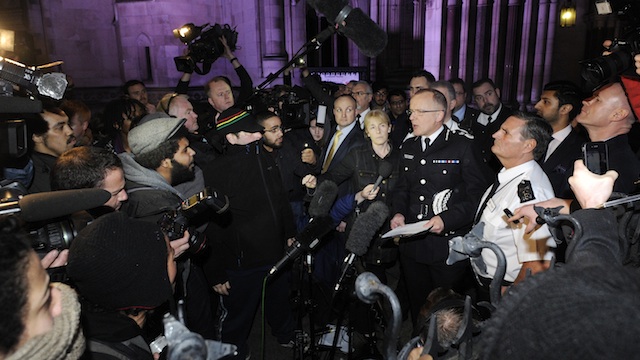SUMMARY
This is AI generated summarization, which may have errors. For context, always refer to the full article.

LONDON, United Kingdom (UPDATED) – A British inquest jury concluded Wednesday, January 8, that police lawfully shot dead a man in 2011, prompting an angry reaction two years after his death sparked nationwide riots.
The family of suspected gang member Mark Duggan shouted obscenities at jurors after the verdict, while police said reinforcements were ready to deal with any fresh unrest.
The 29-year-old father of six was gunned down after police stopped the taxicab in which he was traveling in Tottenham, north London, in August 2011.
The resulting unrest in London, Birmingham, Manchester and other English cities left five people dead and caused millions of pounds’ worth of damage.
The jury ruled that Duggan did not have a gun in his hand when he was shot by a police marksman in the arm and the chest.
But they concluded that he had a gun with him in the taxi and threw the weapon over a nearby fence seconds before the killing.
“We will still fight for justice,” his brother Shaun Hall said outside the Royal Courts of Justice in London, following the ruling.
His aunt Carole Duggan said the dead man had been “executed” by the police while protesters shouted “murderer” at a senior policeman outside court.
Metropolitan Police chief Bernard Hogan-Howe welcomed the verdict, but admitted “some in the community are still angry at Mr Duggan’s death”.
“My officers do not set out to run an operation that results in someone dying,” he said in a statement. “They are brave people who risk their own lives to keep the public safe.
He also acknowledged the need for police “to do more, much more, to improve our relationships with black Londoners” and offered his condolences to Duggan’s family.
Duggan, who had previous convictions for low-level offenses, had been under surveillance for suspected gang links when armed police stopped him in the taxi on August 4, 2011.
They had intelligence that he might have collected a gun from another man, Kevin Hutchinson-Foster.
The jury found that police had not done enough to gather and react to this intelligence, but they recorded a verdict of lawful killing by an 8-2 majority.
Hutchinson-Foster was jailed for 11 years in February for supplying the gun.
‘Further clarification’ of death needed
The judge had told the jury to consider whether the officer who shot Duggan had honestly believed he was carrying a weapon.
The officer, identified only as V53, had testified during the inquest that he believed Duggan was holding a weapon when he shot him.
Duggan’s brother shouted obscenities at jurors as they left court while other supporters screamed “murderers”.
Some smashed a door and security staff were called to contain the situation.
Lawmakers and community leaders called for calm after the decision.
David Lammy, the opposition Labour member of parliament for Tottenham, said that “further clarification” was needed on the events surrounding Duggan’s death to heal relations between residents and police.
Duggan’s mother Pam and aunt Carole led a march of around 30 people to Tottenham police station, the epicenter of the 2011 riots, but the crowd had largely dispersed by around 9 pm (2100 GMT).
A Scotland Yard spokesman told Agence France-Presse that police had an “operation in place across London” that included the ability to send extra officers to Tottenham if needed.
Britain’s Independent Police Complaints Commission is also investigating Duggan’s shooting.
Two days after Duggan was killed, the deprived district of Tottenham erupted in violence, and the unrest then spread across the capital and on to Birmingham, Manchester and other English cities.
Hundreds of shops were looted, with many set alight, as groups of angry youths marauded through the streets.
Dozens of people were jailed for offenses related to the riots.
Inquests are heard in Britain after sudden or unexplained deaths. The jury had a choice of three conclusions: lawfully killed, unlawfully killed or an open conclusion. – Rappler.com
Add a comment
How does this make you feel?
There are no comments yet. Add your comment to start the conversation.